AI Strategy Consulting Services
Table Of Content
Published Date :
19 Nov 2025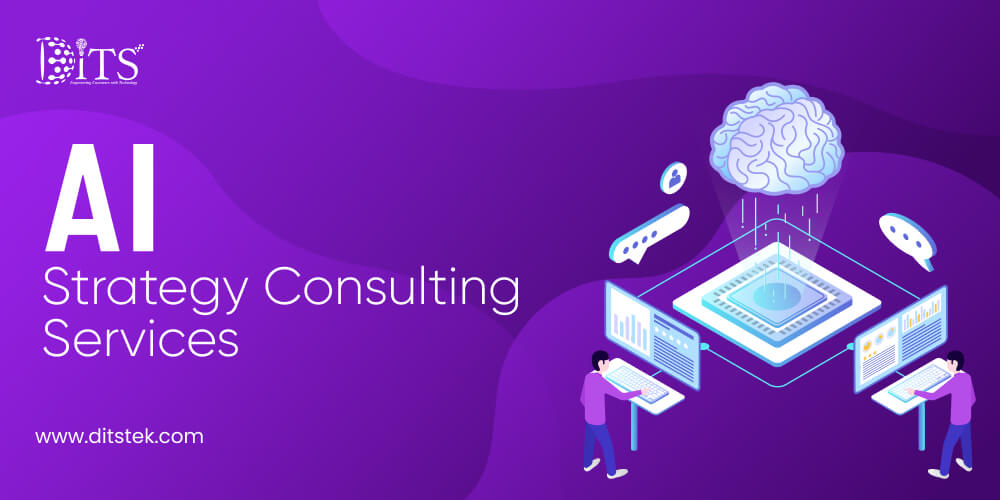
Every business talks about using AI these days, but when it comes to actually putting it to work, things often feel scattered. Some companies jump into new tools without knowing what they truly need. Others try small experiments here and there, hoping something sticks. However, most companies don’t know the right direction.
That’s where AI strategy consulting steps in. It helps a business decide what to build that actually creates value and helps them achieve long-term goals. More companies are now seeking AI strategy consulting to help them understand and manage the complexities of adopting these technologies.
For example, a growing retail company is trying to improve forecasting. One team wants automation, another wants predictive insights, and leadership wants quick wins without breaking budgets. In fact, many businesses run into the same wall, enthusiasm without a plan. And that’s exactly why strategy becomes the starting point.
This article breaks down the key elements of AI strategy consulting, explains why it matters for improving efficiency and driving innovation, and outlines what AI consultants do. It also walks through the steps involved in building a strong AI strategy and discusses the common challenges organizations encounter without the use of AI.
What Is AI Strategy Consulting?
AI strategy consulting is the bridge between complex technology and real business requirements. Many organizations hear about machine learning, automation, or advanced analytics and feel pressured to “use AI somehow,” but they’re not always sure what fits or what actually delivers value. That’s where AI strategy consulting steps in. It becomes a guide that helps a company define a clear direction rather than making decisions based on assumptions or trends.
And here’s something many businesses don’t realize: the need for this guidance is growing fast. A recent study highlighted a surprising gap - AI adoption is rising everywhere, yet only a small portion of organizations have proper policies or direction in place.
Some organizations seek AI strategy consulting services when they’re starting fresh. Others need it after multiple pilots fail to scale. Either way, the benefit is the same - clarity, alignment, and a roadmap that feels doable. And that’s what gives businesses the confidence to invest without second-guessing every step.
Ready to Transform With AI?
Unlock a purpose-built AI strategy that elevates operations, strengthens decision intelligence, and accelerates enterprise-wide modernization.
Business Challenges An AI Strategy Solves
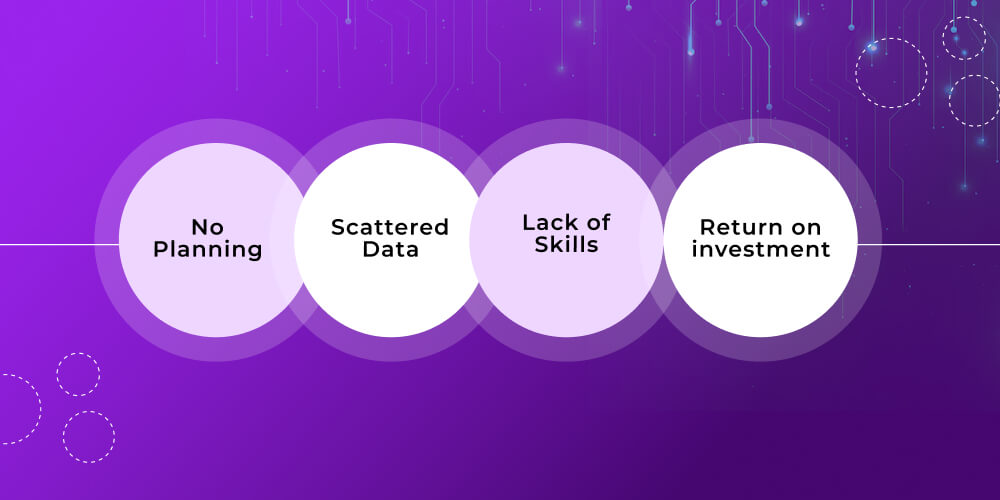
The idea of using AI feels exciting as it automates processes and solves multiple challenges, but the execution is not so simple. That’s exactly where a solid strategy steps in, because it clears the fog around what’s possible and what’s practical.
No Planning
One common challenge is the lack of direction. A business might try a few AI pilots, maybe an automation workflow or a forecasting model, but may not feel connected. Without a unified plan, these efforts seem like an experiment that never scales. An AI strategy gives shape to the bigger picture, showing which initiatives truly deserve attention.
Scattered Data
Data issues create another hurdle. The data in some companies is outdated, inconsistent, or spread across too many systems. It’s frustrating because the potential is there, but the organization cannot use it. A structured approach helps the business understand what to fix, what to prioritize, and how to build a long-term data environment that actually supports AI.
Lack of Skills
Another challenge comes when the internal teams lack the skills and knowledge to use AI. Teams might worry about job shifts, new skills, or the learning curve. It’s natural. AI doesn’t just change software, it changes workflows. A well-designed strategy includes training plans and clear communication, so employees feel part of the journey.
Return on investment
The most crucial factor for every business is return on investment. A strategy outlines expected outcomes, timelines, possible risks, and early wins. It turns uncertainty into something a company can measure and track.
In short, an AI strategy doesn’t just solve one challenge. It pulls together the scattered pieces, data, technology, people, processes, and goals, and helps the business move forward with confidence.
Steps To Create An Effective AI Strategy
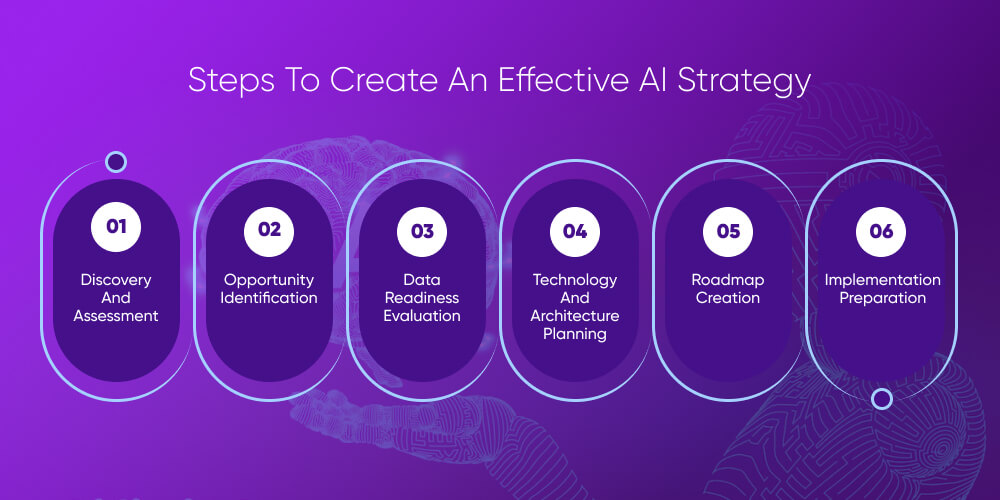
Artificial intelligence holds the potential to solve multiple business challenges, but companies need to follow proper steps to create and implement an AI strategy.
Discovery And Assessment
Creating a strong AI roadmap begins with understanding how the business works today. Teams walk through daily processes, challenges, delays, and aspirations. Some insights feel small at first, but they often uncover deeper opportunities once discussions open up. This stage sets the direction for the rest of the journey.
Opportunity Identification
Not every workflow needs automation, and not every department requires intelligence. This is where priorities start to shift. AI consulting service providers like DITS help the organization sort through ideas, spot meaningful use cases, and focus energy where AI can genuinely move the needle. It’s the part where potential becomes clearer.
Data Readiness Evaluation
This is the stage when things get real. A company may think it has enough data, but it may not be sufficient or might be scattered across systems. AI strategy consultant may discover gaps or inconsistencies once while reviewing everything closely. A structured analysis highlights what’s usable, what needs work, and how to build a data foundation that won’t collapse later.
Technology And Architecture Planning
With countless tools in the market, choosing the right one often feels challenging for companies. A strategy trims away unnecessary noise. It highlights the solutions that support long-term goals instead of forcing the company into something shiny but unsuitable. Some organizations also explore broader options like AI consulting services during this phase when they want deeper, cross-functional support.
Roadmap Creation
This is the moment the plan becomes real. A detailed roadmap lays out timelines, milestones, quick wins, risks, and integration paths. Leaders appreciate this part because it shows exactly how AI will unfold within the business, step by step, without guesswork.
Implementation Preparation
The final stage connects everything. Ownership is assigned, teams are prepared, risks are mapped, and responsibilities become clear. This ensures the organization doesn’t leap into development without structure. By this point, the business has a clear blueprint shaped through thoughtful AI strategy development, not assumptions.
Looking to Modernize Processes?
Re-architect workflows, eliminate inefficiencies, and embed intelligent automation across mission-critical functions with strategic oversight.
How To Choose The Right AI Strategy Consulting Partner
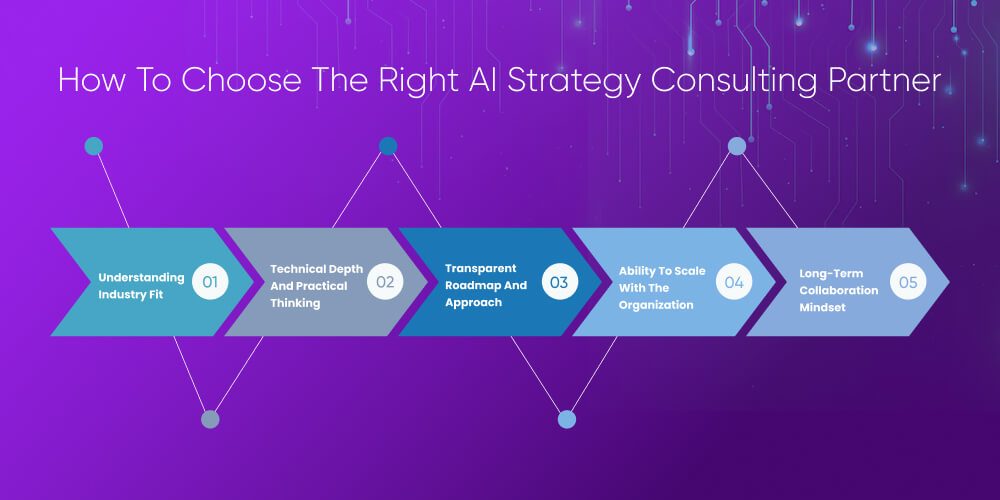
Understanding Industry Fit
Every consulting partner looks good, but the real test is whether they understand how your industry works. A manufacturing company, for example, faces very different challenges compared to a healthcare provider or a logistics business. If the partner hasn’t worked with similar environments, the learning curve becomes long and costly. A good fit is a company that has worked in your industry and has a deep knowledge and understanding of how it works.
Technical Depth And Practical Thinking
Some firms lean heavily on technical jargon. Others focus too much on business talk. The right partner balances both. They should be able to explain complex ideas in a way leadership teams understand, while also diving deep into architecture, models, and integration when needed.
It’s this mix that separates a true strategic partner from a general advisor. Many companies look for an AI consulting company that can translate theory into something executable, not just impressive on slides.
Transparent Roadmap And Approach
A reliable partner always follows a transparent approach and roadmap. They walk the business through every stage - assessments, data planning, prioritization, risks, and execution. When a partner is confident in their approach, everything becomes clear upfront, and you know exactly what to expect.
Ability To Scale With The Organization
AI isn’t a one-time initiative. It grows, changes, and expands with the company. The consulting partner should be capable of supporting that growth, instead of struggling to keep up. This includes expertise in broader areas like AI software development, data systems, automation workflows, and cross-platform integrations. If they can’t support future phases, the partnership eventually breaks.
Long-Term Collaboration Mindset
A trustworthy partner acts like an extension of the internal team. They help the business refine strategy, adjust plans when market conditions shift, and guide teams during implementation. Business should feel their support throughout the journey, not just at the beginning.
Build A Winning AI Strategy With DITS
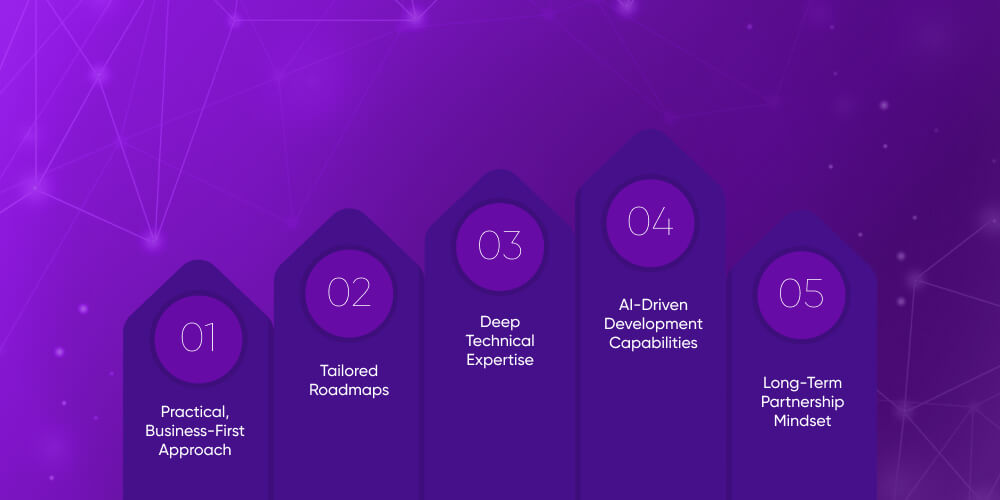
Practical, Business-First Approach
DITS works closely with organizations that want to bring clarity to their AI journey without drowning in complexity. Instead of dropping heavy technical frameworks, our team begins with detecting what slows operations, where decisions feel delayed, and which processes demand more intelligent systems. Once that picture becomes clear, AI strategy consulting services become practical and achievable.
Tailored Roadmaps
Every company grows differently, so a one-size-fits-all plan never works. At DITS, we shape our AI strategy around the company’s goals, existing systems, and long-term vision. Some businesses need early automation wins while others focus on analytics or decision intelligence. The roadmap adapts to the business, and that’s what helps organizations avoid unnecessary spending.
Deep Technical Expertise
Teams often choose us when they want a partner who understands both business workflows and technical foundations. Being a custom software development company with a decade of experience, DITS understands system architecture, data readiness, cloud environments, and integrated intelligence across platforms.
AI-Driven Development Capabilities
One thing that sets DITS apart is how we integrate intelligence into every layer of our engineering process. We actively use AI for software development, quality assurance, maintaining code quality, and customizing solutions for complex workflows.
Long-Term Partnership Mindset
AI isn’t something a company sets up once and forgets. Markets shift, customer expectations change, and systems need ongoing refinement. DITS works as a long-term partner optimizing models, updating strategies, and helping teams adapt as new possibilities emerge.
When companies want a partner that understands planning as well as execution, and strategy as much as delivery, DITS has proved to be a reliable AI driven company that offers not only consulting but the right implementation of artificial intelligence across processes, systems and decision-making.
Struggling With AI Adoption?
Remove friction, de-risk implementation, and streamline enterprise transformation with advisory intelligence designed for measurable business impact.
Conclusion
AI can push a business forward in ways that weren’t possible a few years ago, but only when there’s a clear direction behind every decision. A structured strategy removes that uncertainty. It helps the organization move with intention, not guesswork.
With the right guidance, teams feel more confident, leaders see measurable progress, and the entire organization moves in the same direction. DITS brings this clarity to businesses that want to evolve without unnecessary complexity. With thoughtful planning and execution, companies get a roadmap that’s both realistic and future-ready. And once that foundation is in place, AI stops feeling overwhelming and starts becoming a real advantage.
FAQs
What Is AI Strategy Consulting?
AI strategy consulting is a pro service to help a business set the role of AI in the support of its objectives. It comprises the entire hopscotch of determining potential, fiancé, data, tech, and at last, a path to follow for the rollout. The aim is to avoid the scenario where AI is being used randomly in experiments rather than through well-thought-out areas.
Why Do Companies Need AI Strategy Consulting Services?
Companies require AI strategy consulting services in order not to incur expensive blunders, adopt the wrong tools, and last but not least, AI everywhere be used in line with the actual priorities of the business. In the absence of a strategy, firms frequently confront problems with vague goals, pilot projects, challenges with data, and low returns on investment.
What Should a Company Look For in an AI Consulting Partner?
The company should consider industry experience, technical ability, openness, adaptability, and the capability to assist in both the strategizing and the actual implementation. By selecting an AI consulting partner with engineering capabilities, the firm is assured that its strategy will be carried out without any disconnects.
Is AI strategy consulting worth the investment for small and mid-size businesses?
Definitely. Smaller companies usually get the biggest slice of the cake because of their need for concentrated investments, speedy victories, and cost-saving methods. A well-thought-out plan ensures that there are no unnecessary costs and that the resources are allocated to the areas with the most impact.
Does DITS Help With Execution After Strategy Creation?
Of course. DITS takes care of both the planning and the execution. Our experts help in system design, application development, data processing, and continuous improvement. AI is also integrated across the software to facilitate engineering, testing, and personalization.
How Much Does It Cost To Build an AI Strategy?
Pricing is contingent on factors like the project’s scope, its complexity, and the readiness of the system. Generally, companies can anticipate a specified budget range once the evaluations start. It is intended that the investment will produce measurable results rather than just documents or reports.
Will AI strategy consulting lead to an increase in ROI?
Yes, a systematic strategy enables a company to effectively prioritize the highest value-creating initiatives, to less impactful projects and to solutions that can be extended. The return on investment is directly improved by turning AI from a trial into a useful asset.

Dinesh Thakur
21+ years of IT software development experience in different domains like Business Automation, Healthcare, Retail, Workflow automation, Transportation and logistics, Compliance, Risk Mitigation, POS, etc. Hands-on experience in dealing with overseas clients and providing them with an apt solution to their business needs.
Recent Posts
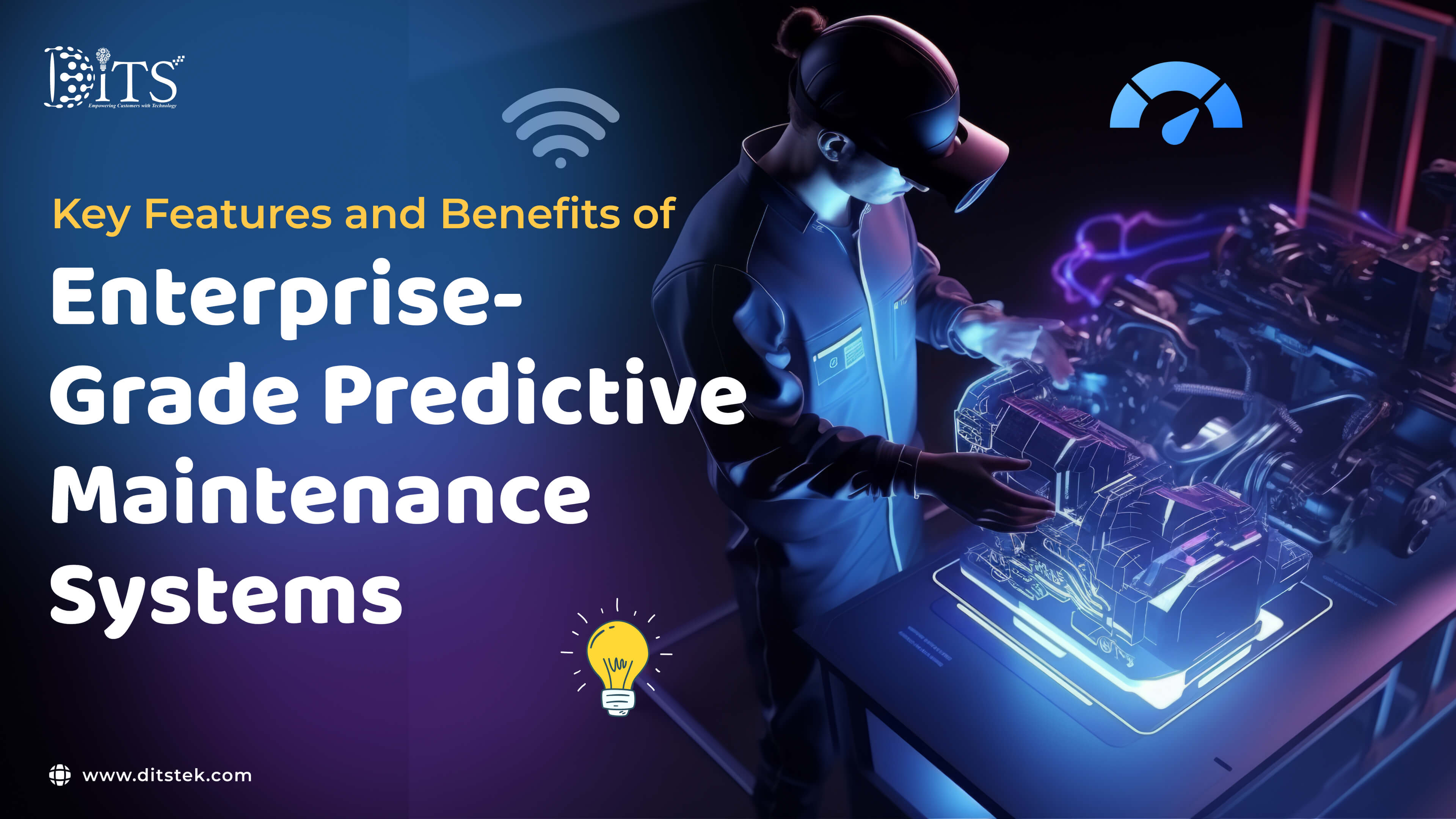
Explore predictive maintenance software features that reduce downtime, cut costs, and boost efficiency with enterprise-grade, AI-powered maintenance systems.

Benefits of AI in real estate include better cash flow planning, improved marketing ROI, stronger pipeline visibility, and scalable growth.

We at DITS offer custom Population Health Management Software Solutions to help you measure the effectiveness and efficiency of care delivery to patients. Read our blog to know in detail.